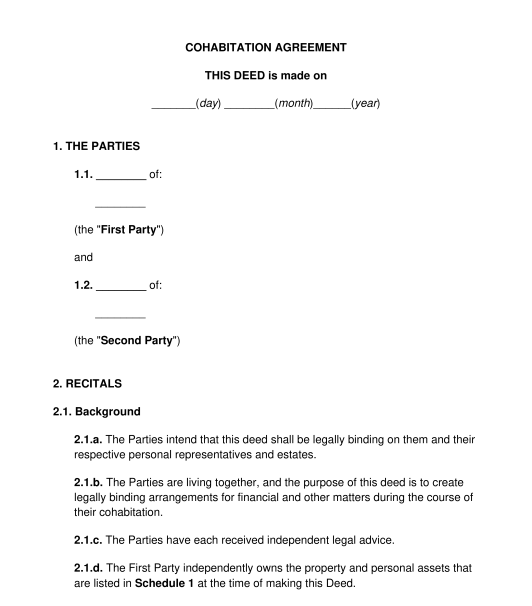 27/11/2025
27/11/2025

Answer a few questions and your document is created automatically.

Your document is ready! You will receive it in Word and PDF formats. You will be able to modify it.

 27/11/2025
27/11/2025
 Word and PDF
Word and PDF
 8 to 9 pages
8 to 9 pages
A cohabitation agreement can be used when two people intend to live together. This agreement will clarify who owns particular assets and how bills should be paid. This agreement is for use in England and Wales.
A pre-nuptial agreement is an agreement that is entered into before marriage or a civil partnership. This type of agreement will specify what will happen to assets and finances in the event of a divorce or dissolution.
A cohabitation agreement will typically be used by an unmarried couple (who do not intend to marry in the future).
No. It is not mandatory. This type of agreement can be helpful because unmarried couples do not have the same rights as married couples. Married couples will have certain claims available to them if they decide to divorce.
The agreement can be helpful to ensure there is a clear understanding of what will happen in the event of separation.
Before signing and entering into a cohabitation agreement, each party should:
This document will not reviewed by a lawyer to ensure that the legal content applies to the personal situation of the parties. In order to review the particulars of the final agreement and to receive advice about this, it will be necessary to instruct a lawyer. This document will take the form of a deed. For assistance finalising, reviewing and executing a deed, advice should be sought from a lawyer who is regulated by an approved regulator in the legal services sector. It is possible to search for a lawyer using the Law Society – find a solicitor webpage.
Two individuals who are living together can enter into a cohabitation agreement. Usually, this will be an unmarried couple, however, it might also include friends or other relations who are living together. The parties should be over the age of 18 and should be able to make decisions for themselves.
The agreement can be made without specifying any fixed end date. It will be intended to remain in place for the duration of the relationship. The agreement will specify how the agreement may be ended early, for example by:
After the document has been signed by each party, they should retain a signed copy.
The schedules at the end of the agreement will be completed by the parties to set out the details of:
The document must be executed as a deed. This means that the signature of each party must be witnessed. The witness should:
For assistance finalising, reviewing and executing a deed, advice should be sought from a lawyer who is regulated by an approved regulator in the legal services sector. It is possible to search for a lawyer using the Law Society – find a solicitor webpage.
The parties should obtain independent legal advice about the contents of the agreement. The solicitor will advise of their fees in advance.
Yes, a cohabitation agreement can be legally binding. It is important that the parties can show that they have entered into the document voluntarily, of their own accord and should ensure they understand the implications of entering into the agreement. The parties should each obtain independent legal advice to address this point.
A cohabiting couple may also wish to make sure they have a will in place, to ensure that they have specified how their assets should be dealt with after their death.
A cohabitation agreement should include the following:
The following key legal provisions will be relevant to a cohabitation agreement:
You fill out a form. The document is created before your eyes as you respond to the questions.
At the end, you receive it in Word and PDF formats. You can modify it and reuse it.
A guide to help you: Signing Documents in England and Wales
Cohabitation Agreement - Template - Word & PDF
Country: United Kingdom